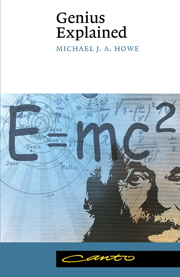The Real World
,_Physicist.jpg)

October 2013 The Psychologist, 26 (10), 705.
Psychologists have always had a fascination with the exceptional — particularly in the realm of intellect. Here two topics that have dominated the literature since the pioneering work of Francis Galton in the 19th century are creativity and genius. What is it that made Einstein such a great physicist, van Gogh such a great painter, Mozart such a great composer?
In many ways the most obvious answer to such questions makes recourse to an exceptional psychology grounded in the special qualities that set creative geniuses apart from the rank and file whose mediocrity throws their abilities into such stark relief. This is a profoundly consoling idea — especially in times of crisis — allowing us to dream, like Max Weber, of the genius saviour who will come along to solve all our problems. But by the same token, it is a profoundly reactionary idea. We, the masses, are led to accept that our place is to stand beneath our intellectual superiors and gaze up at them with wonderment and awe.
Over time, challenges to this idea have taken multiple forms. First, researchers have noted that most people (if not all) have the capacity to be immensely creative in particular domains at particular points in time. Relatedly, second, Mihaly Csikszentmihalyi’s systems theory points to the fact that creativity seems to be a product of the relationship between an individual and a given social field — such that there are particular places and moments in which creativity and genius thrive: Italy in the Renaissance, England in World War II, Silicon Valley in the 1980s. And finally, third, even Galton himself observed that there is a reputational dimension to creativity and genius such that they are contingent upon recognition from others. A person whose creative genius no-one else acknowledges is a lunatic.
Such critiques take us away from the idea that creativity and genius are ‘other-worldly’, and point to the possibility that they are very much products of the groups and societies in which an individual is located. This is a point that one of us (Alex) — working together the Spanish and Dutch Psychologists Inma Adarves-Yorno, Tom Postmes, and Lise Jans —made in a recent Personality and Social Psychology Review paper that outlines a social identity model creativity.
Critically and uniquely, this model points to the importance of the group-based relationship between the two essential components of the creative process: creators and their audience. On the one hand this means that the form creativity takes depends upon the extent to which an individual buys into, and wants to advance, a given group’s agenda. On the other hand, it means that the recognition accorded to any creative act depends on the extent to which perceivers regard the acts of the creator to advance the interests of a group membership they value.
Such conclusions resonate with the wisdom of an unsung genius of British psychology — Michael Howe, late professor of Psychology at the University of Exeter, and the person who first excited our interest in these topics. Based on his own extensive biographical research, in his 2002 book Genius Explained he concluded that rather than reflecting innate super-human qualities, genius is the product of two key factors: hard work (typically in pursuit of a shared goal) and very good networking (insights subsequently rediscovered by Malcom Gladwell in his 2008 best-seller, Outliers: The Story of Success).
“It is not until we understand that [geniuses] are made from the same flesh and bones as the rest of us”, Howe writes, “that we start to appreciate just how wonderfully remarkable these men and women really are. They show us what humankind is capable of. And it is only when we acknowledge that geniuses are not totally unlike other people that our minds open up to all that we can learn from them.”
In this way, the celebration of creativity should centre not its fetishisation but on its democratisation. For in order to be valued by us, originality needs to be understood as of us and for us. Without these things it becomes an excuse for subjugation rather than emancipation.
The Real World
A Migrant is not a migrant by any other name
October 2015
It's a man's (virtual) world
June 2014
Putin: The Naked Truth
April 2014
In praise of asylums
September 2013
You had to be there
June 2013